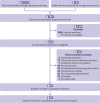Occurrence, prevention, and management of the psychological effects of emerging virus outbreaks on healthcare workers: rapid review and meta-analysis
- PMID: 32371466
- PMCID: PMC7199468
- DOI: 10.1136/bmj.m1642
Occurrence, prevention, and management of the psychological effects of emerging virus outbreaks on healthcare workers: rapid review and meta-analysis
Abstract
Objective: To examine the psychological effects on clinicians of working to manage novel viral outbreaks, and successful measures to manage stress and psychological distress.
Design: Rapid review and meta-analysis.
Data sources: Cochrane Central Register of Controlled Trials, PubMed/Medline, PsycInfo, Scopus, Web of Science, Embase, and Google Scholar, searched up to late March 2020.
Eligibility criteria for study selection: Any study that described the psychological reactions of healthcare staff working with patients in an outbreak of any emerging virus in any clinical setting, irrespective of any comparison with other clinicians or the general population.
Results: 59 papers met the inclusion criteria: 37 were of severe acute respiratory syndrome (SARS), eight of coronavirus disease 2019 (covid-19), seven of Middle East respiratory syndrome (MERS), three each of Ebola virus disease and influenza A virus subtype H1N1, and one of influenza A virus subtype H7N9. Of the 38 studies that compared psychological outcomes of healthcare workers in direct contact with affected patients, 25 contained data that could be combined in a pairwise meta-analysis comparing healthcare workers at high and low risk of exposure. Compared with lower risk controls, staff in contact with affected patients had greater levels of both acute or post-traumatic stress (odds ratio 1.71, 95% confidence interval 1.28 to 2.29) and psychological distress (1.74, 1.50 to 2.03), with similar results for continuous outcomes. These findings were the same as in the other studies not included in the meta-analysis. Risk factors for psychological distress included being younger, being more junior, being the parents of dependent children, or having an infected family member. Longer quarantine, lack of practical support, and stigma also contributed. Clear communication, access to adequate personal protection, adequate rest, and both practical and psychological support were associated with reduced morbidity.
Conclusions: Effective interventions are available to help mitigate the psychological distress experienced by staff caring for patients in an emerging disease outbreak. These interventions were similar despite the wide range of settings and types of outbreaks covered in this review, and thus could be applicable to the current covid-19 outbreak.
© Author(s) (or their employer(s)) 2019. Re-use permitted under CC BY-NC. No commercial re-use. See rights and permissions. Published by BMJ.
Conflict of interest statement
Competing interests: All authors have completed the ICMJE uniform disclosure form at www.icmje.org/coi_disclosure.pdf and declare: no support from any organisation for the submitted work; no financial relationships with any organisations that might have an interest in the submitted work in the previous three years; no other relationships or activities that could appear to have influenced the submitted work.
Figures
Comment in
-
Covid-19: adverse mental health outcomes for healthcare workers.BMJ. 2020 May 5;369:m1815. doi: 10.1136/bmj.m1815. BMJ. 2020. PMID: 32371465 No abstract available.
-
Covid-19: recording their stories provides emotional benefit to healthcare workers.BMJ. 2020 Jun 29;369:m2536. doi: 10.1136/bmj.m2536. BMJ. 2020. PMID: 32601051 No abstract available.
-
Covid-19 and the future of mental health in primary care.BMJ. 2020 Jun 30;369:m2520. doi: 10.1136/bmj.m2520. BMJ. 2020. PMID: 32606020 No abstract available.
-
Healthcare workers are at risk of acute or post-traumatic stress and psychological distress during emerging virus outbreaks.Evid Based Nurs. 2021 Oct;24(4):136. doi: 10.1136/ebnurs-2020-103317. Epub 2020 Oct 21. Evid Based Nurs. 2021. PMID: 33087408 No abstract available.
References
-
- Cascella M, Rajnik M, Cuomo A, et al. Features, Evaluation and Treatment Coronavirus (COVID-19). StatPearls. StatPearls Publishing LLC, 2020. - PubMed
Publication types
MeSH terms
LinkOut - more resources
Full Text Sources
Miscellaneous



